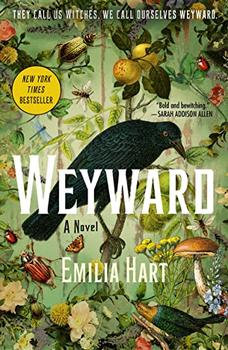Book Club Discussion Questions
In a book club? Subscribe to our Book Club Newsletter!
For supplemental discussion material see our Beyond the Book article, The Pendle Witches and our BookBrowse Review of Weyward.
Please be aware that this discussion guide will contain spoilers!
- Consider the evolution of the name "Weyward" and the way women in this novel receive it. Why and how do the Weyward women grow to accept and proudly own this name? Why do you think more recent versions of Macbeth have replaced "Weyward" with "Weird"?
- "The Weyward women had lived safely in Crows Beck these last hundred years, and in that time had healed its people ... We could use our ability to heal without attracting too much suspicion. The people were grateful for this gift" (page 279). How does the knowledge of other Weyward women help Altha, Violet, and Kate heal when they need to? What role does nature play in healing these three Weyward women?
- Consider the ways that witchcraft shapes all three narrative threads. Who does society deem to be a witch, and what are the factors that fuel that kind of accusation?
- Violet spends a lot of time and energy in search of information about her mother. Similarly, Kate seeks to understand who Violet was. Once they both find answers, how does this new knowledge affect Violet and Kate moving forward? Does it change the way they view themselves at all?
- Though we never hear from her directly, Elizabeth's actions have repercussions that trickle down to Violet, and eventually, Kate. What did you make of the choice to not include her narration? How do she and Altha shape the present narrative, even though they're both long deceased?
- We learn that Kate "reread books she'd loved as a child" for the comfort of their familiarity (page 22). How did the themes from various works of Shakespeare, The Secret Garden, and Grimms' Fairy Tales make an impression on both Kate and Violet? Do you have a book that you've returned to over the years, and what about it makes you keep coming back? Can a familiar text also be read in new ways?
- Describe Violet and Graham's relationship and its evolution throughout the novel.
- Why do you think Simon, Rupert, Frederick, and John Milburn feel the need to establish dominance over the women in their lives? How do Graham, Henry, and Adam Bainbridge differ from these men?
- Compare and contrast how Kate, Violet, and Grace feel about their pregnancies, which were a product of toxic relationships. Do you think Kate's decision to keep her baby was affected by what she learned about the earlier Weyward women?
- How do the traumas that Kate and Violet each experience affect how they view themselves? How do they work through this, and how do they arrive at new perspectives by the end of the novel? What role does forgiveness play in this evolution?
- In Altha's and Violet's worlds, it is considered a "sin" for a woman to deliberately end her pregnancy, and therefore, they can be punished by the law. Is this ideology still at work today? How do religious beliefs play a role in U.S. lawmaking regarding women's bodily autonomy? What are your thoughts on how the concept of sin relates to our contemporary definitions of crime?
- This novel follows the lives of three different women in three different time periods. How did the movement between these perspectives affect your reading experience? In what other ways were these women linked, aside from their familial ties?
- Did you connect with one character more than the others? If so, why? What do the parallels in their stories say about the female experience and/or the degree to which society's treatment of women has evolved?
- In what ways does this novel nudge at the idea of a woman returning to her natural, most free state of being? What does it mean to you to utilize the gift of your inner wild?
Unless otherwise stated, this discussion guide is reprinted with the permission of St. Martin's Griffin.
Any page references refer to a USA edition of the book, usually the trade paperback version, and may vary in other editions.
